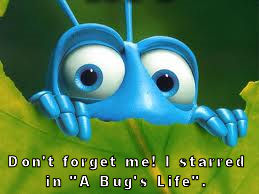 Are the campaign priorities of environmental organizations driven by the dictates of science or the dictates of finance? Is environmentalism a movement---or a business? Whose sustainability are the green NGOs in business to foster----the environment's, or theirs?
Are the campaign priorities of environmental organizations driven by the dictates of science or the dictates of finance? Is environmentalism a movement---or a business? Whose sustainability are the green NGOs in business to foster----the environment's, or theirs?

"Very few of us are bothered about creepy-crawlies, which is doubtless why there has been so little awareness of the staggering decline in insect numbers which has emerged, in recent years, as a disturbing environmental phenomenon, indeed, as one of the defining ecological features of our age and an alarming pointer to the future. But they don't only creep and crawl; these are "the little things that run the world", playing key roles in myriad ecosystems, and their disappearance has profound dangers..." Michael McCarthy of the Independent
http://www.independent.co.uk/environment/nature/nature_studies/nature-studies-by-michael-mccarthy-the-21st-century-bodes-ill-for-nonhuman-species-2196
The question is, why aren't the mainstream environmental organizations directing attention to this issue? Answer---IT IS NOT A FUNDING TOOL.
Imagine a Sierra Club campaign to save the creepy-crawlies. I can see the poster now---a leatherjacket fighting for its life as it writhes in pain after a thoughtless Tea-bagger sprayed his lawn with weed killer. Mounting a campaign to save the majestic "Rocky Mountain Cariboo" , or better yet, the magnificiently beautiful "Great Spirit Bear", on the other hand, is a proven winner---money just rolls in and the bureaucracy lives to fight another day. Insects don't fly----at least as a hook in pulling public heart-strings and purse-strings.
The same principle applies to the issue of population growth, and especially to immigration as its key driver. Why touch it when so many politically correct green yuppies might get antsy and walk away, or a corporate donor like the Royal Bank of Canada or TD bank might just stop giving? Better to focus on climate change and pictures of drowning polar bears, and pretend that good planning ("smart growth") will nullify any negative ecological impacts of population growth. But if green NGOs truly believe that climate change is a consequence of human activity, how can they be cavalier about the growing number of humans in that part of the globe where per capita greenhouse gas emissions are the highest (--or second highest, if Australians want to claim that title)? The imperatives of finance clearly dictates the priorities of environmental campaigns, not science.
Green Inc. must be seen for what it is. A business. A testament to Robert Michels "Iron Law of Oligarchy": any revolutionary organization or institution that dedicates itself to fundamental change and in the process grows a bureaucracy to achieve it, will come to pursue policies which serve the bureaucracy even if they run counter to the original aims of the movemnent.
Tim Murray
January 29/ 2011

Comments
Bandicoot
Mon, 2011-01-31 10:36
Permalink
The elephant in the room
Anonymous (not verified)
Tue, 2011-02-01 09:46
Permalink
Australia First Party document
tim
Tue, 2011-02-01 14:27
Permalink
Bandicoot. Interesting. I
tim
Tue, 2011-02-01 14:40
Permalink
Patriotism, can't have that
Anonymous (not verified)
Tue, 2011-02-01 16:46
Permalink
Time to change the 14th Amendment United States
Anonymous (not verified)
Thu, 2011-02-10 14:50
Permalink
Stevensen, early 20th century advocate for Australian culture
Subject was: From Inky Stephensen - 1939 Issue of 50 Points for Australia
AUSTRALIAN CULTURE: Point 2, “for Australian culture; against imitativeness,” implies an obligation upon all Australian individuals, whether as private citizens or as components of the Government, to foster the growth of a distinctive National Australian culture in Australia, as a means of preventing intellectual and biological decline; for a nation without pride in its own traditions could not endure: and it is the distinctiveness of culture and custom which differentiates one nation from another, and thus creates National Unity, National Consciousness, the pre-requisite of National Survival. Lacking a distinctive Australian culture, Australians are nondescripts: and the utmost to which they could aspire would be to excel in imitation. By seeking to conform with cultural habits originated elsewhere, Australians brand themselves as uncreative mediocrities, despised by those they imitate. The opportunity to establish and maintain a distinctive Australian National Culture is thus the opportunity to establish and maintain a distinctive Australian Nation. If this opportunity is declined or shirked, the Australian community will vanish from history, without trace.
Editorial comment: Thanks for this. Related links I obtained from a crude 'Google' search include:
P. R. Stephensen by Kerry Bolton
'Their Ultimate Absorption': Assimilation in 1930s Australia by John Chesterman and Heather Douglas
Eras Journal - Georgina Fitzpatrick, Inky Stephensen's internment ... (PDF)
PERCY REGINALD STEPHENSEN (PDF)
Add comment